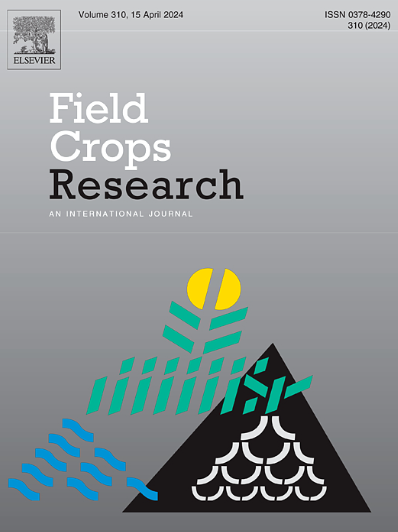优化向日葵产量:了解授粉者的贡献,为农业环境战略提供依据
IF 5.6
1区 农林科学
Q1 AGRONOMY
引用次数: 0
摘要
背景由于全球粮食需求增加而导致的农业集约化损害了世界各地的授粉者群落。然而,一些经济上最重要的油籽作物(如向日葵)却依赖授粉者生产种子。虽然自交品种经过了遗传选择以保证产量,但对授粉者的依赖程度和授粉者的经济贡献还没有充分估计。在此,我们旨在探索限制伊比利亚半岛最常用向日葵品种农业产量的花卉和授粉者制约因素。结果我们的研究结果表明,授粉者的依赖程度与向日葵品种有很大关系,对产量和生产率都有影响,例如单株产量值在 0.188 到 0.692 之间。有几个品种可以自花授粉并生产种子,与授粉者无关。然而,大多数品种的外交会显著提高结籽率,最高可达 0.341。总体而言,种子的数量和重量之间存在权衡。在自然田间条件下,授粉昆虫显著提高了向日葵的总产量,但不同地区之间存在差异(布尔戈斯的增产幅度为 275 千克/公顷,昆卡为 382 千克/公顷),并产生了相关的经济效益。虽然有些品种在没有传粉昆虫的情况下也能结出种子,但向日葵明显受益于昆虫授粉。意义至少在实施的头几年,将景观恢复干预措施与种植自相容品种结合起来,可能是保持生产水平和经济效益的一个可靠的额外农业环境策略,尤其是在高度简化的农业生态系统中,可以减轻授粉者和生物多样性损失的影响。本文章由计算机程序翻译,如有差异,请以英文原文为准。
Optimizing sunflower yield: Understanding pollinator contribution to inform agri-environmental strategies
Context
The agricultural intensification due to global increased food demand has harmed pollinator communities worldwide. However, some of the economically most important oilseed crops, such as the sunflower, depend on pollinators to produce seeds. While self-fertile varieties have undergone genetic selection to guarantee productivity, the pollinator-dependence levels and the economic contribution of pollinators have not been fully estimated.
Objective
Here, we aimed to explore floral and pollinator constraints limiting the agricultural yield of sunflower varieties most frequently used in the Iberian Peninsula.
Methods
Pollination experiments were undertaken to analyse the pollinator-dependence level of 12 varieties under controlled conditions and also under natural conditions in 23 fields of two Spanish agricultural regions. The selfing ability and economic contribution of pollinators were estimated by comparing bagged and open-pollination treatments.
Results
Our results showed that the degree of pollinator-dependence is highly dependent on sunflower variety, with impacts on production and productivity outcomes, e.g. individual plant yield values varied between 0.188 and 0.692. Several varieties could self-fertilize and produce seeds regardless of pollinators. However, outcrossing significantly increased seed set in most varieties with increments up to 0.341. Overall, a trade-off between the number and weight of seeds was observed. Under natural field conditions, pollinators significantly increased overall sunflower production, although differences were observed among regions (increment of 275 kg/ha in Burgos and 382 kg/ha in Cuenca), with an associated economic outcome.
Conclusions
The self-fertilization ability and the level of pollinator-dependence vary according to the intrinsic reproductive traits of the variety analysed. Although some varieties are able to produce seeds despite the absence of pollinators, the sunflower clearly benefits from insect pollination. The landscape context and the availability of pollinator communities influenced the final crop yield and the economic outcome.
Significance
Combining landscape-restoring interventions with the cultivation of self-compatible varieties during at least the first years of implementation may be a solid additional agri-environmental strategy to maintain production levels and economic outcomes, which may particularly mitigate effects of pollinator and biodiversity losses mainly in highly simplified agroecosystems.
求助全文
通过发布文献求助,成功后即可免费获取论文全文。
去求助
来源期刊

Field Crops Research
农林科学-农艺学
CiteScore
9.60
自引率
12.10%
发文量
307
审稿时长
46 days
期刊介绍:
Field Crops Research is an international journal publishing scientific articles on:
√ experimental and modelling research at field, farm and landscape levels
on temperate and tropical crops and cropping systems,
with a focus on crop ecology and physiology, agronomy, and plant genetics and breeding.
 求助内容:
求助内容: 应助结果提醒方式:
应助结果提醒方式:


